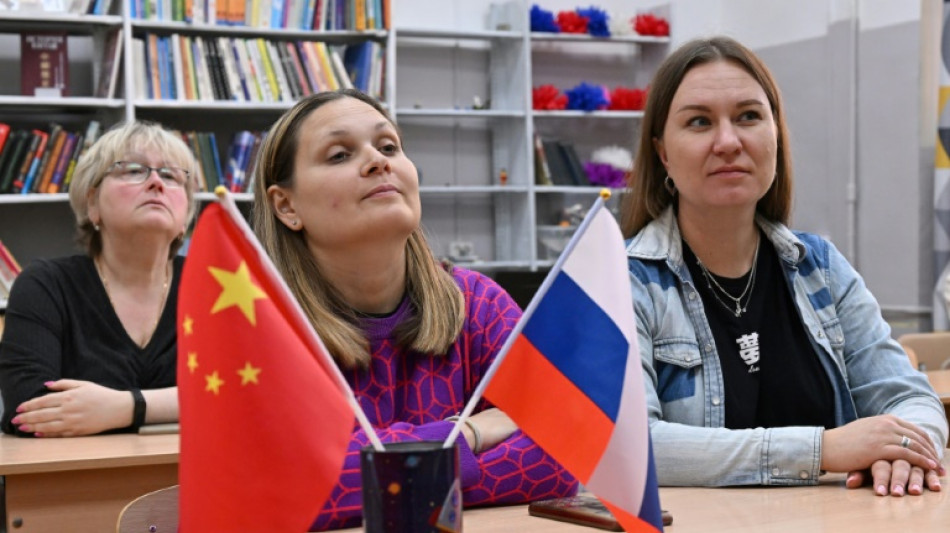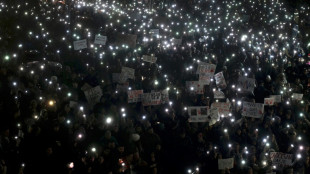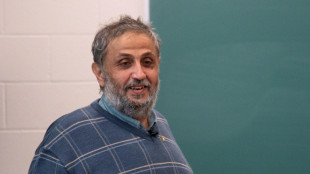
-
 Sweeping Vietnam internet law comes into force
Sweeping Vietnam internet law comes into force
-
Thousands attend Christmas charity dinner in Buenos Aires

-
 Demand for Japanese content booms post 'Shogun'
Demand for Japanese content booms post 'Shogun'
-
Mystery drones won't interfere with Santa's work: US tracker

-
 Global stocks mostly higher in thin pre-Christmas trade
Global stocks mostly higher in thin pre-Christmas trade
-
NASA probe makes closest ever pass by the Sun

-
 Global stocks mostly rise in thin pre-Christmas trade
Global stocks mostly rise in thin pre-Christmas trade
-
Global stocks mostly rise after US tech rally

-
 Investors swoop in to save German flying taxi startup
Investors swoop in to save German flying taxi startup
-
Saving the mysterious African manatee at Cameroon hotspot

-
 The tsunami detection buoys safeguarding lives in Thailand
The tsunami detection buoys safeguarding lives in Thailand
-
Asian stocks mostly up after US tech rally

-
 US panel could not reach consensus on US-Japan steel deal: Nippon
US panel could not reach consensus on US-Japan steel deal: Nippon
-
The real-life violence that inspired South Korea's 'Squid Game'

-
 El Salvador Congress votes to end ban on metal mining
El Salvador Congress votes to end ban on metal mining
-
Five things to know about Panama Canal, in Trump's sights

-
 Mixed day for global stocks as market hopes for 'Santa Claus rally'
Mixed day for global stocks as market hopes for 'Santa Claus rally'
-
Trump's TikTok love raises stakes in battle over app's fate

-
 European, US markets wobble awaiting Santa rally
European, US markets wobble awaiting Santa rally
-
NASA solar probe to make its closest ever pass of Sun

-
 Volkswagen boss hails cost-cutting deal but shares fall
Volkswagen boss hails cost-cutting deal but shares fall
-
Sweden says China blocked prosecutors' probe of ship linked to cut cables

-
 UK economy stagnant in third quarter in fresh setback
UK economy stagnant in third quarter in fresh setback
-
Global stock markets edge higher as US inflation eases rate fears

-
 US probes China chip industry on 'anticompetitive' concerns
US probes China chip industry on 'anticompetitive' concerns
-
Mobile cinema brings Tunisians big screen experience

-
 Honda and Nissan to launch merger talks
Honda and Nissan to launch merger talks
-
Asian markets track Wall St rally as US inflation eases rate fears

-
 Honda and Nissan expected to begin merger talks
Honda and Nissan expected to begin merger talks
-
Asian markets track Wall St rally as US inflation eases rate worries

-
 Trump vows to 'stop transgender lunacy' as a top priority
Trump vows to 'stop transgender lunacy' as a top priority
-
Beyond Work Unveils Next-Generation Memory-Augmented AI Agent (MATRIX) for Enterprise Document Intelligence

-
 Sweet smell of success for niche perfumes
Sweet smell of success for niche perfumes
-
'Finally, we made it!': Ho Chi Minh City celebrates first metro

-
 Tunisia women herb harvesters struggle with drought and heat
Tunisia women herb harvesters struggle with drought and heat
-
Trump threatens to take back control of Panama Canal

-
 Secretive game developer codes hit 'Balatro' in Canadian prairie province
Secretive game developer codes hit 'Balatro' in Canadian prairie province
-
Stellantis backtracks on plan to lay off 1,100 at US Jeep plant

-
 Banned Russian skater Valieva stars at Moscow ice gala
Banned Russian skater Valieva stars at Moscow ice gala
-
Biden signs funding bill to avert government shutdown

-
 Sorrow and fury in German town after Christmas market attack
Sorrow and fury in German town after Christmas market attack
-
France's most powerful nuclear reactor finally comes on stream

-
 Sierra Leone student tackles toxic air pollution
Sierra Leone student tackles toxic air pollution
-
Amazon says US strike caused 'no disruptions'

-
 Qualcomm scores key win in licensing dispute with Arm
Qualcomm scores key win in licensing dispute with Arm
-
Scientists observe 'negative time' in quantum experiments

-
 US approves first drug treatment for sleep apnea
US approves first drug treatment for sleep apnea
-
Amazon expects no disruptions as US strike goes into 2nd day

-
 US confirms billions in chips funds to Samsung, Texas Instruments
US confirms billions in chips funds to Samsung, Texas Instruments
-
Wall Street rebounds despite US inflation ticking higher


Russia's Asia pivot spurs boom in Chinese classes
Every Sunday, Chinese tutor Kirill Burobin begins work in the early morning and is kept busy until midnight.
As Russia seeks to tighten ties with China amid Moscow's military campaign in Ukraine, the number of Burobin's students has tripled over the past year.
"Sunday is the busiest," 20-year-old Burobin, who makes a good living with his online lessons, told AFP.
"I have 16 hours of classes virtually without a break."
The boom in demand for Chinese lessons in Russia illustrates the country's pivot towards Asia as tensions build between Moscow and the West.
Chinese President Xi Jinping's three-day visit to Russia beginning Monday aims to deepen what the two countries have called a "no-limits" relationship, which is increasingly important for Russia as its international isolation deepens.
Pummelled by multiple rounds of Western sanctions, Russia's economic and technological development is becoming more dependent on China.
Natalia Danina, a manager at HeadHunter, the country's top online recruitment company, said that last year there were nearly 11,000 vacancies requiring knowledge of the Chinese language, a 44 percent increase compared to 2021.
Over the same period, the number of jobs for Chinese speakers in Russia has doubled in sales, transport and logistics, said Danina, pointing to an "accelerated transition" to Chinese-made equipment and spare parts.
Demand for Chinese speakers in energy jobs has tripled, she added.
- 'Just the start' -
Burobin, who also studies Eastern civilisations at a top Moscow university, said that he was happy to help his students learn more about "a whole new world".
"Russians are taking up Chinese because Beijing has become our main partner for decades to come," he said.
"And this is just the beginning."
In August, Avito, Russia's leading online classified ads platform, reported a 138 percent increase in requests for Chinese lessons in Moscow in one year.
The same figure stood at 350 percent for the far eastern city of Vladivostok.
The popularity of Chinese classes might be starting to catch up with demand for English lessons in the country.
Alina Khamlova, 26, who teaches both languages, said she had only three English language students this year, compared to 12 who are learning Chinese.
One of her students is Maria, a 22-year-old designer who dreams of travelling to China to make her clothes there because it is "cheaper than in Russia".
Another student is a 25-year-old gym coach, Ivan, who wants to work in China because Europeans "are paid very well" there.
Khamlova also said that many young people in Russia hope to study in Chinese universities now that many European establishments had become "inaccessible to them".
While English still retains a dominant position, the number of high school students who chose Chinese as a foreign language during their final school exams has doubled in one year to 17,000, according to the state education watchdog Rosobrnadzor.
- 'No one will defeat us' -
Russia's growing isolation from the West has prompted many language schools to revise their curricula and invite teachers of the Chinese language.
Founded in 2017, the ChineseFirst language centre has seen twice as many registrations this year, said its co-founders, Wang Yinyu, 38, and his Russian wife Natalia, a 33-year-old Chinese speaker.
Wang's family business is booming, and he is planning to open two new branches and a kindergarten in Moscow.
In Russia, "many companies have rushed to Chinese factories to order goods that have become unavailable in Russia due to sanctions," he told AFP in Russian.
And Chinese entrepreneurs, who are interested in exporting to Russia, are looking for bilingual employees.
Wang is glad that China and Russia are becoming closer.
"China has powerful industry and Russia is rich in resources, which means that our two countries can build their own internal economy," he said.
"If we stand back-to-back, no one will defeat us."
C.Peyronnet--CPN




